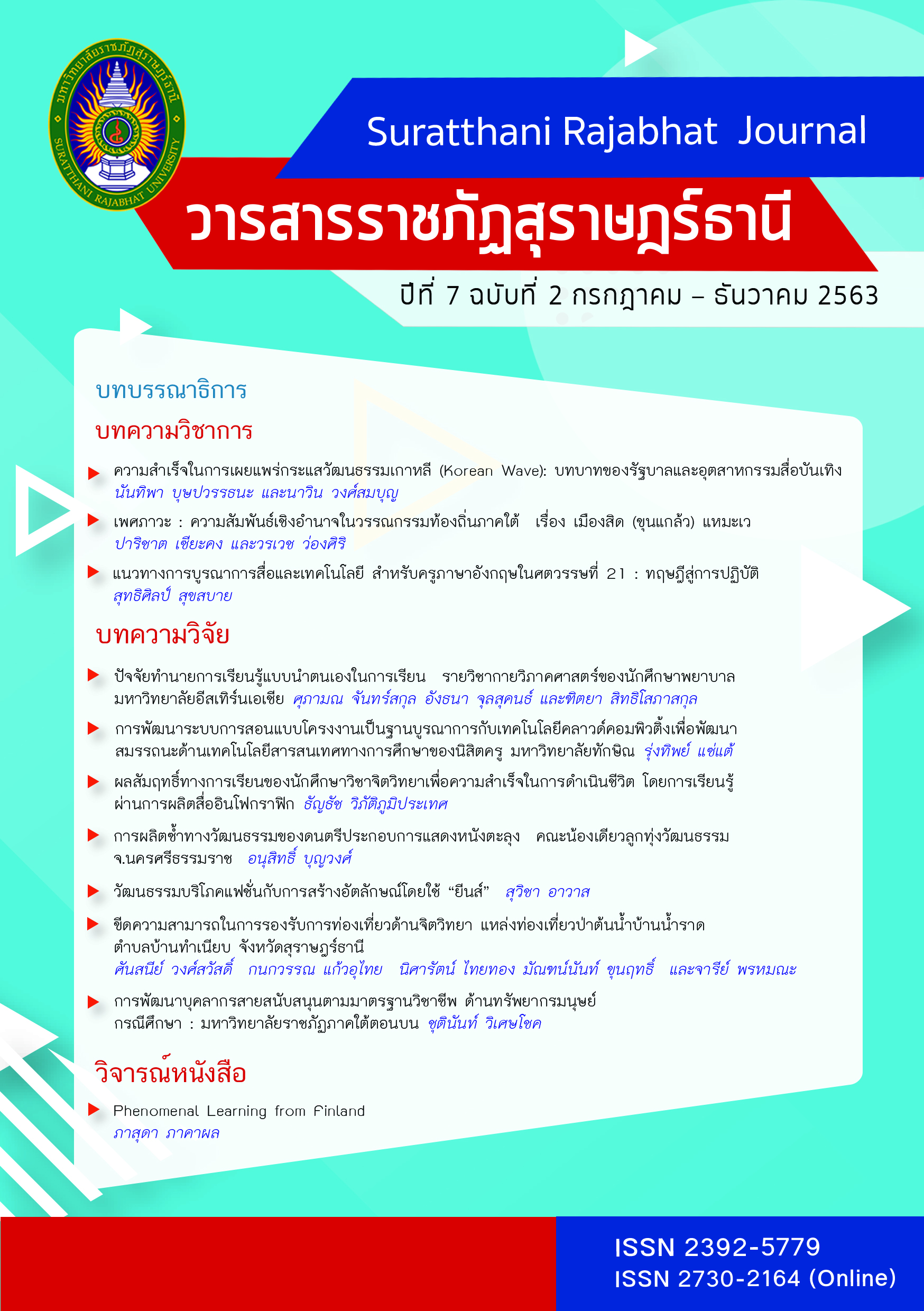Learning Achievement of Psychology for Successful Life Subject of Undergraduate Students Using Infographic Creation-Based Learning
Main Article Content
Abstract
The purposes of this research were: 1) to compare undergraduate students’ learning achievement of the subject Psychology for Successful Life between infographic creation-based learning group and traditional learning group; and 2) to compare their learning achievement after learning through infographic creation-based activities with a criterion of 75%. The posttest-only control group design was used by collecting the data from Pathumwan Institute of Technology students who enrolled in the subject 1111005 Psychology for Successful Life in the second semester of the academic year 2018 and which were purposively divided into one experimental group (infographic creation-based learning group) (n= 38) and one control group (traditional learning group) (n= 30). Independent t-tests and one sample t-tests were used to analyze the data collected. The results indicated that: 1) learning achievement of infographic creation-based learning group was higher than traditional learning group at the 0.05 level of statistical significance (t= 2.249, p= .014); and 2) learning achievement of infographic creation-based learning group was higher than the criterion of 75% at the 0.05 level of statistical significance (t= 2.672, p= .005).
Article Details
References
จิราภรณ์ ตั้งกิตติภาภรณ์. (2557). จิตวิทยาทั่วไป. สำนักพิมพ์แห่งจุฬาลงกรณ์มหาวิทยาลัย.
ทิศนา แขมมณี. (2555). ศาสตร์การสอน : องค์ความรู้เพื่อการจัดกระบวนการเรียนรู้ที่มีประสิทธิภาพ (พิมพ์ครั้งที่ 16). สำนักพิมพ์แห่งจุฬาลงกรณ์มหาวิทยาลัย
ธัญธัช วิภัติภูมิประเทศ. (2560). ผลสัมฤทธิ์ทางการเรียนของนักศึกษาวิชาประชาคมอาเซียนโดยการเรียนรู้จากการผลิตสื่อ Infographic. วารสารรังสิตสารสนเทศ, 23(2), 7-20.
ธัญธัช วิภัติภูมิประเทศ. (2562). สังคมวิทยาดิจิทัล: แนวคิดและการนำไปใช้. วารสารราชภัฏสุราษฎร์ธานี, 6(1), 43-55.
นพมาศ ธีรเวคิน. (2555). จิตวิทยาสังคม. สำนักพิมพ์มหาวิทยาลัยธรรมศาสตร์.
บุญชม ศรีสะอาด. (2556). การวิจัยเบื้องต้น (พิมพ์ครั้งที่ 9). สุวีริยาสาส์น.
ผ่องพรรณ ตรัยมงคลกูล และสุภาพ ฉัตราภรณ์. (2555). การออกแบบการวิจัย. สำนักพิมพ์มหาวิทยาลัยเกษตรศาสตร์.
พิมพันธ์ เดชะคุปต์ และ พเยาว์ ยินดีสุข .(2554). สร้างนวัตกรรมการเรียนรู้ด้วยการวิจัยปฏิบัติการในชั้นเรียน. โรงพิมพ์แห่งจุฬาลงกรณ์มหาวิทยาลัย.
ศุภลักษณ์ จุเครือ. (2561). การสร้างสื่อประชาสัมพันธ์ในรูปแบบ Giographic. Thai Journal Online. https://www.tcithaijo.org/index.php/srj/article/view /187968 /131959.
สายใจ คุณบัวลา, มณเทียร ชมดอกไม้ และนพดล พรามณี. (2558). ผลสัมฤทธิ์ทางการเรียนคอมพิวเตอร์แอนนิเมชั่นเบื้องต้นและความสามารถในการใช้เทคโนโลยีของนักเรียนชั้นมัธยมศึกษาปีที่ 3 ที่สอนโดยใช้ทฤษฎีการสร้างความรู้ด้วยตนเองโดยการสร้างสรรค์ชิ้นงาน. วารสารจันทรเกษม, 21(40), 99-108.
สำนักมาตรฐานและประเมินผลอุดมศึกษา สำนักงานคณะกรรมการการอุดมศึกษา. (2561). แนวทางการส่งเสริมคุณภาพการจัดการเรียนการสอนของอาจารย์ในสถาบันอุดมศึกษา. ภาพพิมพ์.
เอมอร จารุรังษี และคณะ. (2559ก). เอกสารการสอนชุดวิชาจิตวิทยาเพื่อการดำรงชีวิต หน่วยที่ 1-7. โรงพิมพ์มหาวิทยาลัยสุโขทัยธรรมาธิราช.
เอมอร จารุรังษี และคณะ. (2559ข). เอกสารการสอนชุดวิชาจิตวิทยาเพื่อการดำรงชีวิต หน่วยที่ 8-15. โรงพิมพ์มหาวิทยาลัยสุโขทัยธรรมาธิราช.
Bada, S. O. (2015). Constructivism Learning Theory: A Paradigm for Teaching and Learning. IOSR Journal of Research & Method in Education, 5(6), 66-70.
Colaiacovo, K. (2017). An Interesting Timeline of the Evolution of Social Media. Paperitmarketing. https://www.p Thai Journal Online epperitmarketing.com/facebook/evolution-social media.
Johnson, B. & Christensen, L. (2004). Educational Research: Quantitative, Qualitative and Mixed Approaches. Pearson Education.
Lupton, D. (2013). Introducing Digital Sociology. Researchgate. https:// www. researchgate.net/publication/248381396_Introducing_digital_ sociology.


